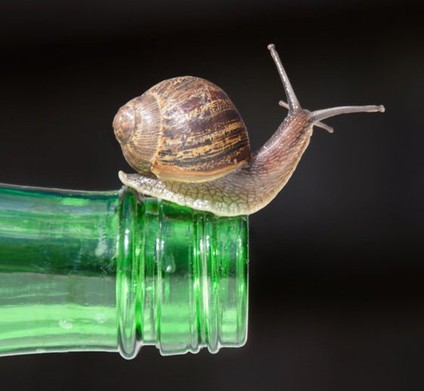
Your Duty of Care and Negligence
Mr Stevenson’s factory in Paisley, making soft drinks – lemonade and ginger beer – for local shops and cafes in Scotland was a hive of activity, with grates of empty bottles stacked in the yard waiting to be refilled.
Then, one day in 1928, a snail crawled into one of the dark glass bottles – where it was drowned in ginger beer – slowly decomposing as the sealed bottle was dispatched to the Wellmeadow Cafe, run by Francis Minghella, just in time for the Glasgow Trade Fair – one of the busiest weeks of the year.
After attending the Glasgow Trade Fair, Miss Donoghue met one of her friends for chat, – and to catch up with all the local gossip – in the Wellmeadow Cafe. Where Miss Donoghue’s friend bought their refreshments, an ice cream for herself and a ‘Scotsman Float’ – ice cream in ginger beer – for Miss Donoghue.
So, as Francis Minghella served his guests, he poured half the bottle of ginger beer into the the Scotsman’s Float – and left the rest on the table for Miss Donoghue.
As they chatted to one another, Miss Donoghue’s friend, topped up the Scotsman’s Float – and the decomposing snail appeared from the bottle of ginger beer. Shocked and horrified by the sight of the rotten snail on her ice cream, Donoghue complained to the cafe owner – Francis Minghella – who apologetically explained that –
- He didn’t now that the Ginger Beer was contaminated, but had relied on his supplier – Mr Stevenson – to supply the ginger beer
- Inspecting the bottle on the table confirmed that it carried Mr Stevenson’s brand markings and printed label, which did not warn the consumers – or cafe owners – that it may contain added protein or decomposing snails.
- Because it was a dark glass bottle their was no practical means of inspection that could have detected the decomposing snail, before he served it to his customer.
So, while he was very sympathetic, Francis Minghella couldn’t accept responsibility for the contamination that, unknown to him, was concealed by the dark glass bottle. When consulted, his solicitor would later confirm that a shop keeper who had sold a tin of rotten salmon was found not guilty – because there was no practical means of inspection that would have enabled him to identify the problem – setting a legal precedent that protected the cafe owner.
So, when Miss Donoghue required hospital treatment for gastro enteritis, she consulted a local lawyer, who helped her prepare her case against Mr Stevenson for negligence in the production of the ginger beer consumed by Donoghue. But the prevailing wisdom and legal precedents in Scots and English Law – most recently expressed in Mullins V AG Bar – was that a supplier’s Duty of Care – obligation to prevent harm –
- Was strictly limited, to the people who were in a contractual relationship with the supplier, unless
- The dangerous nature of the product was being concealed with the intention of deceiving the customer, or
- The supplier failed to warn people of the intrinsic danger of products such as explosives.
So, Donoghue’s case was based on –
- The moral argument that – a supplier should owe a Duty of Care – obligation to prevent harm – to people who use or consume their product – independent of any contractual relationship with them.
- The use of dark glass bottles that prevented consumers conducting an effective inspection of the contents, concealed the danger of contamination, which should created a relationship of trust between the supplier (Mr Stevenson) and consumer (Miss Donoghue)
In 1932, the legal arguments (Donoghue V Stevenson) reached the House of Lords – where 5 Law Lords we asked to decide –
- Does a manufacturer have a Duty of Care to avoid causing harm to members of the public who consume or use their products?
While Stevenson continued to dispute the facts of the case, Donoghue’s legal arguments were persuasive and by majority of 3 – 2 the Court decided in her favor setting a precedent that changed the Law.
In the Court’s Judgement, Lord Atkins concluded that; –
“A manufacturer of products, which he sells in such a form as to show that he intends them to reach the ultimate consumer in the form in which they left him, with no reasonable possibility of intermediate examination, and with the knowledge that the absence of reasonable care in the preparation or putting up of the products will result in an injury to the consumer’s life or property, owes a duty to the consumer to take that reasonable care.”
However, he also went further defining our General Duty of Care – independent of any contractual relationships – when wrote; –
“The rule that you are to love your neighbor becomes in law, You must take reasonable care to avoid acts or omissions which you can reasonably foresee would be likely to injure your neighbor. Who, then, in law, is my neighbor? The answer seems to be – persons who are so closely and directly affected by my act that I ought reasonably to have them in contemplation as being so affected when I am directing my mind to the acts or omissions which are called in question.”
So, this judgement set an important precedent in British law, imposing a Duty of Care on manufacturers to consider the effects their products have on the consumer and take reasonable care to prevent any reasonably foreseeable harm. So, Lord Atkin’s explanation of our Duty of Care – and by extension Negligence – is the foundation on which we can develop our understanding of modern product liability law.
In Donoghue V Stevenson, the use of a dark glass bottle, – concealing the fault and preventing the consumer conducting an effective inspection of the product, – meant that Donoghue was forced to rely upon Stevenson’s Quality Management System. This was sufficient to persuade the Court that Stevenson owed the Donoghue a Duty of Care.
Now, defects may go undetected by consumers – because specialist skills and expert knowledge are needed to assess their safety products relying on software and microprocessors. So, consumers are once again deprived of the opportunity to inspect the product – and must rely on the supplier’s quality assurance processes.
So, recognizing that claimants may find it difficult to assess the safety of some products or prove it they are defective, – the new European Product Liability Directive (EU) 2024 / 2853 allows the Court to presume a product is defective, if the manufacturer withholds the evidence needed to assess it’s safety, or due to technical complexity – or lack of data – the consumer faces ‘excessive difficulty’ in establishing the existence of a specific defect. In those circumstances
To Learn more…..
The Product Liability Training we deliver is designed for engineers and engineering manager responsible for product design and development, manufacturing operations, supply chain management and after market support.
Please contact Phil Stunell to discuss your requirements and arrange your training.

Leave a Reply